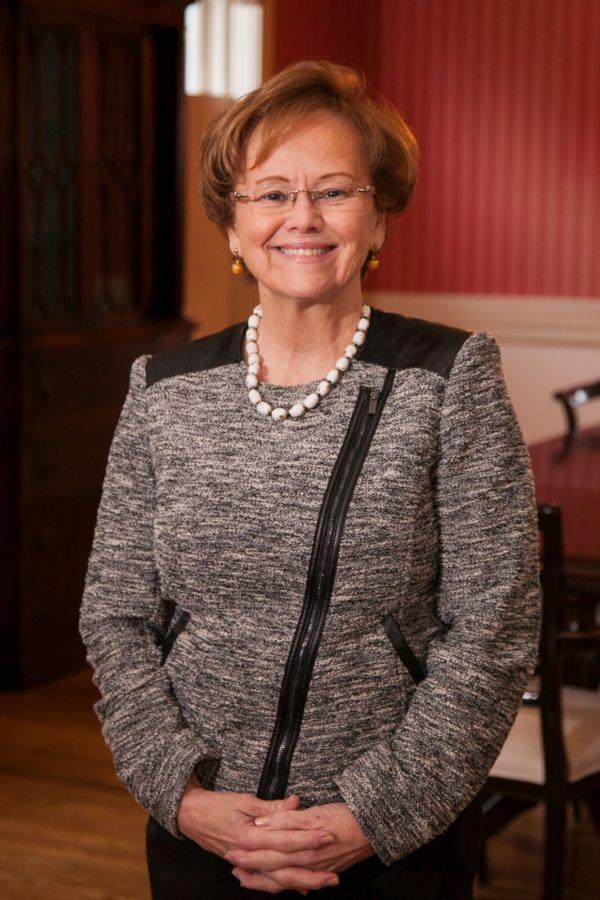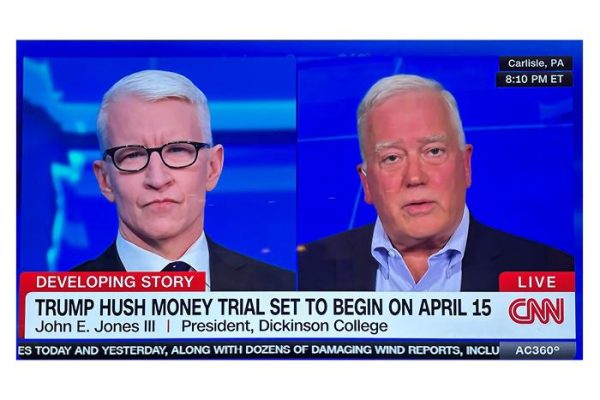“My Hope is that Students…Find Their Paths to Themselves” Dickinson Selects 29th President
Photo Courtesy of Christine Baksi, Director of Media Relations
Dr. Margee Ensign, incoming president, visited campus on Tuesday, Feb. 8.
Dr. Margee Ensign has been chosen as Dickinson College’s 29th President, starting July 1. Serving most recently as the president of the American University of Nigeria (AUN), the only sub-Saharan university on the African continent, she has also held several leadership positions at Columbia University, Tulane University and the University of the Pacific.
Ensign was chosen after a 10-month long, international search within a “diverse pool of well-qualified candidates,” according to an official press release by the college.
Nick Rejebian ’17, a student who served on the search committee, commented that, “President Ensign was a dynamic candidate who brought purpose and passion when articulating her candidacy during the search.”
Board Chair Jennifer Reynolds described Ensign as a “visionary leader with extensive experience as a higher education pioneer and a scholar.”
According to the press release, during her seven years at AUN Ensign “worked with students, faculty, alumni and the university’s board to draft a strategic plan focusing on sustainable development that helped transform the institution, even as it faced enormous security challenges from the Boko Haram uprising. She raised $160 million, increased scholarship funding, and guided the establishment of new programs, including law and engineering. She also introduced sustainable practices and design and oversaw the construction of five major buildings, including the finest digital library on the continent.” She also worked for 15 years as a advisor to the governments of both Uganda and Rwanda.
Ensign was drawn to Dickinson for its rich history. “I couldn’t work at a place that didn’t have a history of academic freedom, of standing up for what’s right,” said Ensign. “…and that’s what your founder did so many years ago when our country was in great turbulence. He said, ‘No, I don’t support slavery, even though it’s accepted,’ and he said ‘Yes, I do believe in women going to school,’ so there was a real visionary who established this school and his spirit is really important to think about, especially in our time. So, that was important to me; the mission and vision, the willingness of the board to make sure at this time now in America that we are standing up, that Dickinson is standing up.”
Ensign also mentioned the importance of the free press, especially in an “alarming” time when “there are a lot of forces working to muzzle and suffocate what the press does, and we simply cannot let that happen.” She “wrote an article in Nigeria a few weeks ago called ‘Democracy Can’t Survive Without a Free Press,’… I believe the subject heading of my paper; it can’t survive. You have to have a free and aggressive press to investigate, to hold people accountable, to make sure people are doing what they’re supposed to be doing.”
Students had the opportunity to speak with Ensign in person during the reception held in the Stern Great Room on Tuesday Feb. 28. Rejebian commented on Ensign’s remarks at the reception saying, “Just from her brief comments today at the campus-wide reception, President Ensign intuitively understands the mission and vision of Dickinson, and will no doubt inspire a renewed sense of engagement with the Dickinson vision (practical education that prepares leaders with a 21st century skill set to solve local, national and international problems) across all campus constituencies. I’m excited for what’s to come, and hope to celebrate her formal arrival to the college at her inauguration next semester.”
Abdullah Rumman ’20, one attendee of this reception, said of Ensign, “her story is an inspirational one. She comes with a lot of international experience and a very cosmopolitan outlook, which is in line with Dickinson’s ideals…She has a very charismatic presence and I’m looking forward to her first few days [in office] as they’ll set the tone and give us things to look ahead to.” Rumman also mentioned that he and Ensign had already made plans to get coffee when she next returns to campus.
Another attendee, Michaela Zanis ’19, is “excited for someone with a philosophy of education being a right, not a privilege and I think with Dickinson having people from so many different backgrounds and different areas, we have people from all across the United States and the world, and I think that with that kind of education philosophy that she has more than proven in her past actions is going to do wonders for [Dickinson].”
Zanis also believes that Ensign’s actions in Nigeria to save 11 girls from Boko Haram by sheltering them at AUN show that “…she values the voice of the individual in her leadership position, which is really nice in a small community because we have the ability to go to the president’s office hours, and it shows that it isn’t her just doing [it] as a formality. I think that she really does care.”
As the Dickinson press release states, “Under her leadership, AUN established study abroad opportunities in 22 countries and—thanks to a generous American donor—a school for the women who had escaped their Boko Haram captors. Ensign also founded and chaired the Adamawa Peace Initiative (API), a Yola-based group of civic and religious leaders that has successfully promoted peace in the area through education, empowerment and community development while feeding 300,000 refugees from the Boko Haram. Her work was featured in the Smithsonian Magazine story, “Escape from Boko Haram,” which lauded Ensign as a ‘fearless American educator.’”
Ensign echoed a focus on community and engagement. She spoke of her AUN students’ experiences with Model UN. “At AUN, we started one of the first on the continent and my students are now invited to the National Model UN in New York. Last year they were given, and I kept telling them ‘You got the hardest country in the world,’ they got Syria…but those types of experiences where you get out of your comfort zone, you look at issues different ways, and then you have to do really hard public work, that’s what Model UN is about. I think that’s transformative. So, those kinds of student engagement activities are really important. I learned at AUN that community engagement service activities, not just going out and volunteering, although that’s really important, but doing it as part of a class or a project where you’re trying to solve a problem, whether it’s related to literacy, the environment, whatever it might be, I find those kinds of activities transformative because you draw on the knowledge that you have but also recognize the skills you need to solve problems… And it’s not just because I like [community engagement in the classroom], it’s because I have seen the transformative learning power of that kind of deep community engagement.”
As many Dickinsonians will be pleased to hear, Ensign is also dedicated to engaging herself in the community. “It’s why we’re at university,” she said of spending time getting to know students, “to interact with students. It’s the fun part!” She also said that she hopes professors will invite her into their classes because she “love[s] being in the classroom!”
In response to any anticipated challenges during the transition to Dickinson, Ensign said, “I need to learn a lot quickly. I need to learn about finances, admission and all of those things.” However, she said that she is looking forward to the transition because, “the people here are so committed, I can already tell that. One of my measures, I ask faculty, ‘How long have you been here?’ and faculty are here 20, 30, 40 years because they love it. And that’s pretty unusual in my experience.”
“My hope,” continued Ensign, “is that students understand [that people are very committed to their education] and that they use every minute to learn, to ask questions, to make sure they are finding their paths to themselves.”




